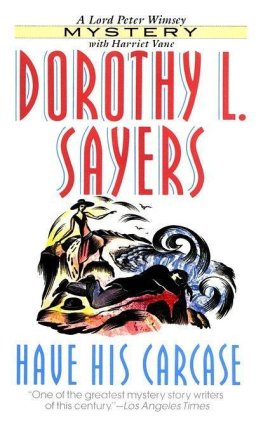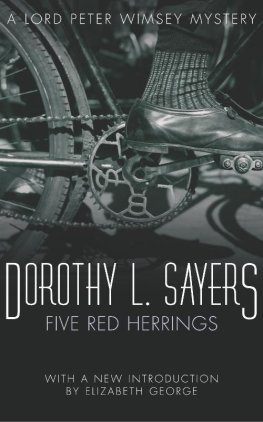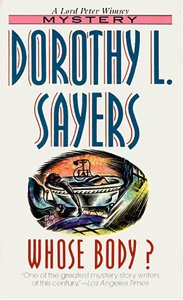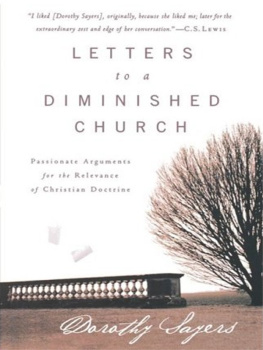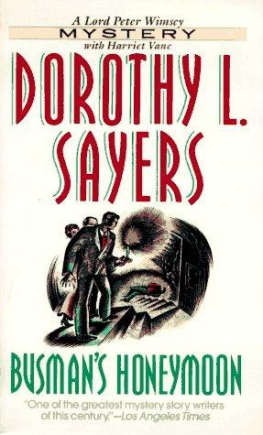Dorothy L. Sayers
Have His Carcase
About The Author
Born in Oxford in 1893, Dorothy Leigh Sayers was later to become a classical scholar and honours graduate in modern languages. Between 1921 and 1.932 she was employed as a copywriter in an advertising agency.
But in 1923 she put into print a character who was to become one of the most popular fictional heroes of the century Lord Peter Wimsy, who features in a dozen novels and numerous short stories. Several of the novels have been adapted for radio and television.
Dorothy Leigh Sayers died in 1957.
Note
In The Five Red Herrings, the plot was invented: to fit a real locality; in this book, the locality has been invented to fit the plot. Both places and people are entirely imaginary.
All the quotations at the chapter heads have, been taken from T. L. Beddoes.
My grateful acknowledgments are due to Mr John Rhode, who gave me generous help with all the hard bits.
Dorothy L Sayers
Contents
Chapter I. The Evidence Of The Corpse
The track was slippery with spouting blood
Rodolph
Thursday, 18 June
THE best remedy for a bruised heart is not, as so many people seem to think, repose upon a manly bosom. Much more efficacious are honest work, physical activity, and the sudden acquisition of wealth. After being acquitted of murdering her lover, and, indeed, in consequence of that acquittal, Harriet Vane found all three specifics abundantly at her disposal; and although Lord Peter Wimsey, with a touching faith in tradition, persisted day in and day out in presenting the bosom for her approval, she showed no inclination to recline upon it
Work she had in abundance. To be tried for murder is a fairly good advertisement for a writer of detective fiction. Harriet Vane thrillers were booming. She had signed up sensational contracts in both continents, and found herself, consequently, a very much richer woman than she had ever dreamed of becoming. In the interval between finishing Murder by Degrees and embarking on The Fountain-Pen Mystery, she had started off on a solitary walking-tour: plenty of exercise, no responsibilities and no letters forwarded. The time was June, the weather, perfect; and if she now and again gave a thought to Lord Peter Wimsey diligently ringing up an empty flat, it did not trouble her, or cause her to alter her steady course along the south-west coast of England.
On the morning of the 18th June, she set out from Lesston-Hoe with the intention of walking along the cliffs to Wilvercombe, sixteen miles away. Not that she particularly looked forward. to Wilvercombe, with its seasonal population of old ladies and invalids and its subdued attempts at the gay life, seeming somehow themselves all a little invalid and old-ladyish. But the town made a convenient objective, and one could always choose some more rural spot for a nights lodging: The coast-road ran pleasantly at the top of a low range of cliffs, from which she could look down upon the long yellow stretch of the beach, broken here and there by scattered rocks, which rose successively, glistening in the sunlight, from the reluctant and withdrawing tide.
Overhead, the sky arched up to an immense dome of blue, just fretted here and there with faint white clouds, very high and filmy. The wind blew from the west, very softly, though the weather-wise might have detected in it a tendency to freshen. The road, narrow and in poor repair, was almost deserted, all the heavy traffic passing by the wider arterial road which ran importantly inland from town to town, despising the windings of the coast with its few scattered hamlets. Here and there a drover passed her with his dog, man and beast alike indifferent and preoccupied; here and there a couple of horses out at grass lifted shy and foolish eyes to look after her; here and there a herd of cows, rasping their jawbones upon a stone wall, greeted her with heavy snufflings. From time to time the white sail of a fishing-boat broke the seaward horizon. Except for an occasional tradesmans van, or a dilapidated Morris, and the intermittent appearance of white smoke from a distant railway-engine, the landscape was as rural and solitary as it might have been two hundred years before.
Harriet walked sturdily onwards, the light pack upon her shoulders interfering little with her progress. She was twenty-eight years old, dark, slight, with a skin naturally a little sallow, but now tanned to an agreeable biscuit-colour by sun and wind. Persons of this fortunate complexion are not troubled by midges and sunburn, and Harriet, though not too old to care for her personal appearance, was old enough to prefer convenience to outward display. Consequently, her luggage was not burdened by skin-creams, insect-lotion, silk frocks, portable electric irons or other impedimenta beloved of the Hikers Column. She was dressed sensibly in a short skirt and thin sweater and carried, in addition to a change of linen and an extra provision of footwear, little else beyond a pocket edition of Tristram Shandy, a vest-pocket camera, a small first-aid outfit and a sandwich lunch.
It was about a quarter to one when the matter of the lunch began to loom up importantly in Harriets mind. She had come about eight miles on her way to Wilvercombe, having taken things easily and made a detour to inspect certain Roman remains declared by the guide-book to be of considerable interest. She began to feel both weary and hungry, and looked about her for a suitable lunching-place.
The tide was nearly out now, and the wet beach shimmered golden and silvery in the lazy noonlight. It would be pleasant, she thought, to go down, to the shore possibly even to bathe, though she did not feel too certain about that, having a wholesome dread of unknown shores and eccentric currents. Still, there was no harm in going to see. She stepped over the low wall which bounded the road on the seaward side and set about looking for a way down. A short scramble among the rocks tufted with scabious and sea-pink brought her easily down to the beach. She found herself in a small cove, comfortably screened from the wind by an outstanding mass of cliff, and with a few convenient boulders against which to sit. She selected the cosiest spot, drew out her lunch and Tristram Shandy, and settled down.
There is no more powerful lure to slumber than hot sunshine on a sea-beach after lunch; nor is the pace of Tristram Shandy so swift as to keep the faculties working at high pressure. Harriet found the book escaping from her fingers.
Twice she caught it back with a jerk; the third time it eluded her altogether. Her head drooped over an an unbecoming angle. She dozed off.
She was awakened suddenly by what seemed to be a shout or cry almost in her ear. As she sat up, blinking, a gull swooped close over her head, squawking and hovering over a stray fragment of sandwich. She shook herself reprovingly and glanced at her wrist-watch. It was two oclock. Realising with satisfaction that she could not have slept very long, she scrambled to her feet, and shook the crumbs from her lap. Even now, she did not feel very energetic, and there was plenty of time to make Wilvercombe before evening. She glanced out to sea, where a long belt of shingle and a narrow strip of virgin and shining sand stretched down to the edge of the water.
There is something about virgin sand which arouses all the worst instincts of the detective-story writer. One feels an irresistible impulse to go and make footprints all over it. The excuse which the professional mind makes to itself is that the sand affords a grand opportunity for observation and experiment. Harriet was no stranger to this impulse. She determined to walk out across that tempting strip of sand. She gathered her various belongings together and started off across the loose shingle observing, as she had often observed before, that footsteps left no distinguishable traces in the sand region above high-water mark.

